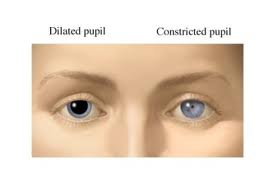

There may be very many causes of dilated pupils but neurological problems are the most common cause of the same. Dilated pupils in children are also quite common. It is basically the result of an excitation of the iris which causes an opening up of the papillary aperature. Source – A fixed and dilated pupil is actually known as Mydriasis. This kind of a pupillary response usually increases with age and aged people suffer from fixed and dilated pupils. In such cases, one may suffer from dilation of the pupils due to a Pavlovian response to some kind of stimulus. Sexual orgasm may also serve as a stimulus for pupil dilation. It may also be a case of pupil dilation attraction, in which case the pupil expands when it is interested in a particular subject. Light conditions acts as a stimuli for uneven pupil dilation. It is characterized by the changes in the size of the pupil. Get your eyes checked today – call Gerstein Eye Institute in Chicago, IL at those who would like to know as to what is a dilated pupil, must be made aware of the fact that dilating pupils are a kind of a physiological response to a stimulus that is actually underlined by involuntary reflex actions. You can’t remember the last time you had an eye exam.You notice sudden changes in your vision, especially after experiencing head.You have to squint to read books or newspapers up close.You have trouble following moving targets or get dizzy and nauseated when you try.You get headaches or experience blurred vision or eye strain after working at a computer for a long time.You have difficulty reading street signs while driving at night.You see spots, excessive floaters or flashes of light.

Here are the signs you should schedule an eye exam: However, if you experience symptoms of eye trouble, you should visit an ophthalmologist right away, no matter when your last eye exam was. Having a vision checkup once a year and following the above-recommended schedule for comprehensive dilated eye exams should keep your vision in good shape. People with special needs: If you’re at risk for eye problems because you have diabetes, a previous eye trauma or surgery, or family history of eye disease, talk to your eye doctor about how often you should get your eyes checked.65 years and older: Schedule a dilated eye exam every one to two years.40 to 64 years old: Schedule a dilated eye exam every two to four years.20 to 39 years old: Schedule a dilated eye exam every two to four years if you’re African-American, or every three to five years if you’re Caucasian.Here are the general guidelines for how frequently you should have comprehensive dilated eye exams: advises having a comprehensive eye exam as often as recommended by your eye doctor. This is useful for detecting eye diseases such as glaucoma, cataracts and macular degeneration. Your prescription expires after this length of time, so it’s important to make sure your eyes haven’t changed before you buy new glasses or order more contacts.ĭuring more thorough eye exams, the ophthalmologist administers special eye drops that make your pupils dilate, or open wide so the doctor can take a closer look at the inside of your eyes. If you wear glasses or contact lenses, you should visit the eye doctor for a vision checkup every one to two years. The question many people have is how often should you get your eyes checked? Consider these recommendations. When caught and treated early, it’s possible to keep your vision crisp and clear. When you get your eyes checked, the ophthalmologist makes sure your prescription hasn’t changed and tests for various conditions that could affect your eyesight. That’s why regular eye doctor visits are invaluable for maintaining your vision. When it comes to your health, prevention is the best medicine.


 0 kommentar(er)
0 kommentar(er)
